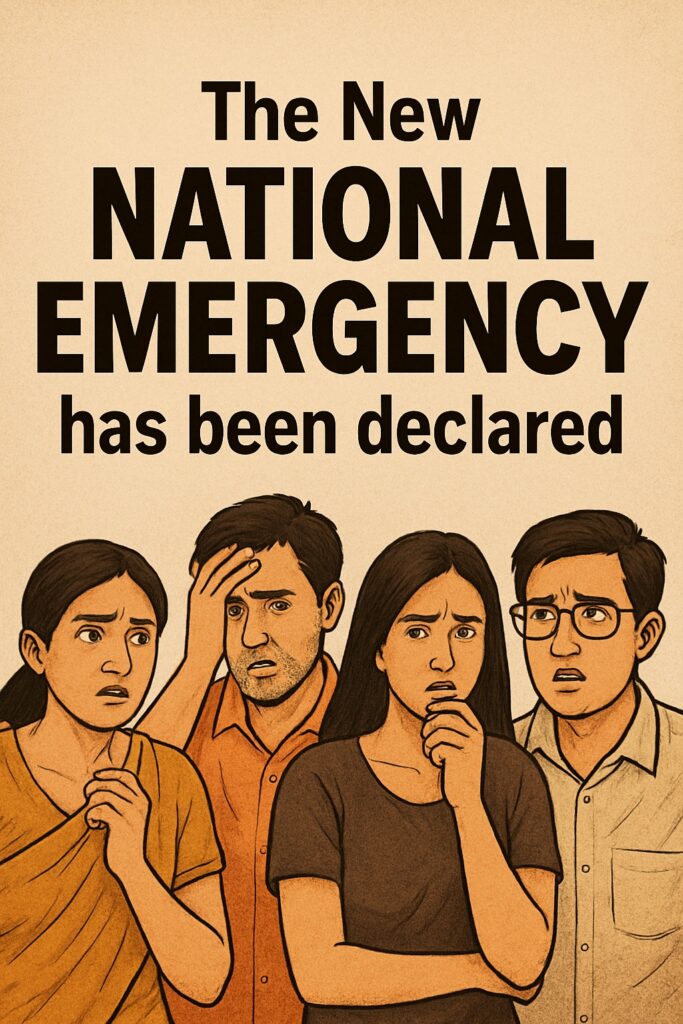81% of Indians Can’t Stop Overthinking, Google Searches Hit All-Time High

Ever spent three hours wondering if your boss’s thumbs-up emoji was sarcastic? Welcome to India’s overthinking epidemic, where 81% of us have turned simple decisions into mental torture chambers. Even our AI assistants are overwhelmed.
Why Indians Ask AI to Decode ‘OK’ Messages While Ignoring Actual Life Decisions
Breaking News: India has officially mastered the art of overthinking. Move over, cricket and Bollywood, we’ve found a new national pastime that requires zero equipment and unlimited mental energy.
The recently released India Overthinking Report by Center Fresh and YouGov has revealed something that probably won’t shock your overactive brain: 81% of Indians spend over three hours a day overthinking, with one in four admitting ‘it’s a constant habit’. That’s right, we’re dedicating more time to mental gymnastics than we do to actual sleep. At this rate, overthinking might qualify as an Olympic sport, and Indians would sweep all the medals.
What Exactly Is Overthinking?
Before we dive deeper into this delightfully chaotic mental rabbit hole, let’s define our star player. Overthinking is when you dwell on or worry about the same thing repeatedly. Think of it as your brain’s version of a broken record player, except instead of your favorite song, it’s playing “What if I said the wrong thing in that meeting seven months ago?” on repeat.
Overthinking, sometimes called rumination, is the process of repetitive negative thinking. It’s like having a very persistent, slightly neurotic roommate in your head who insists on analyzing every possible scenario until your mental CPU overheats. While some thoughtful consideration is healthy, overthinking is when your brain becomes that friend who overanalyzes a simple “okay” text message for three hours.
Why Do We Start Overthinking?
The reasons people begin overthinking are as varied as the flavors in a Indian thali, but research points to several culprits. From an evolutionary standpoint, the brain functions to encourage overthinking as a means of problem-solving. Essentially, our ancestors’ survival depended on constantly scanning for threats, but modern brains haven’t quite figured out that choosing between biryani and dosa for lunch isn’t a life-or-death decision.
Psychologically, overthinking often stems from perfectionism, fear of uncertainty, and past trauma. People who set extremely high standards for themselves frequently exhibit overthinking. They could scrutinize their work excessively out of concern that it’s inadequate or that they’ll make a mistake. Additionally, anxiety, depression, and other mental health conditions frequently contribute to the overthinking spiral.
Brain chemistry also plays a role. Brain chemicals like dopamine, adrenaline, serotonin, and cortisol participate in initiating and sustaining these cyclical loops of thoughts. Dopamine tricks us into thinking we’re solving problems, adrenaline gives us energy to keep “working” on the issue, and when no solution emerges, cortisol floods our system with stress.
What the Report Really Says: The Hilarious and Horrifying Truth
The India Overthinking Report paints a picture so relatable it’s almost comedic, if it weren’t so concerning. 63 per cent of respondents said they rely on platforms like Google to decide what to eat, calling it more stressful than selecting a political leader. Yes, you read that correctly. Choosing Paneer Makhani versus chicken butter masala has become more anxiety-inducing than democracy itself.
The report reveals that one in three Indians uses digital tools, including conversational AI platforms like ChatGPT, to handle indecision, whether it is decoding a short text message or picking a restaurant. We’ve reached peak modernity when artificial intelligence becomes our emotional support system for interpreting whether our boss’s “Sure” means they’re satisfied or planning our termination.
60% people go into a trance with these 3 words, “Can we talk?”, immediately spiralling into worst-case scenarios and reviewing every life decision. Social media compounds the problem, with 35% people rely on google and chatGPT for a support system but they can’t catch a break even with this as 56% overthink about their searches and what people may think.
The Serious Side: Why This Matters
Behind the humor lies a genuine mental health crisis. Overthinking can be caused by depression, anxiety, and other mental health disorders. It can also contribute to these mental health conditions. The habit creates a vicious cycle where excessive thinking leads to more anxiety, which leads to more overthinking.
When it becomes destructive to our life or really impairs our daily functioning, so for example, if you’re having trouble sleeping at night because you can’t turn these thoughts off, that’s impacting your daily functioning, explains psychologist Ashley Carroll from Parkland Memorial Hospital.
How Not to Overthink: Your Mental Escape Plan
The good news? You can train your brain to calm down. Here are proven strategies to break the overthinking cycle:
1. Practice the 5-4-3-2-1 Grounding Technique: Identify 5 things you can see, 4 you can touch, 3 you can hear, 2 you can smell, and 1 you can taste. This anchors you in the present moment.
2. Set “Worry Time”: Allocate 10-15 minutes daily for overthinking, then firmly redirect your thoughts when they wander outside this window.
3. Challenge Your Thoughts: Ask yourself, “Is this thought helpful? Is it true? What would I tell a friend in this situation?”
4. Embrace Physical Movement: Even a 5-minute walk around the block can send an influx of good chemicals and hormones, like endorphins, to our brain, says Foley.
5. Practice Mindfulness: Meditation and breathing exercises help create space between you and your thoughts.
6. Accept Uncertainty: Life is inherently unpredictable. Learning to be comfortable with “I don’t know” can be liberating.
Remember, overthinking is like having 30 browser tabs open in your mind—it slows everything down and drains your battery. Sometimes the best solution is simply to close a few tabs and focus on what actually matters. After all, that “okay” text from your boss probably just means “okay”—not that you’re fired, friendless, and destined for a life of regret.
Your brain deserves better than being trapped in an endless loop of “what-ifs.” Give it permission to rest, and watch how much clearer everything becomes.


